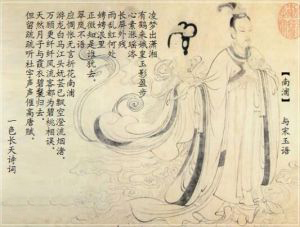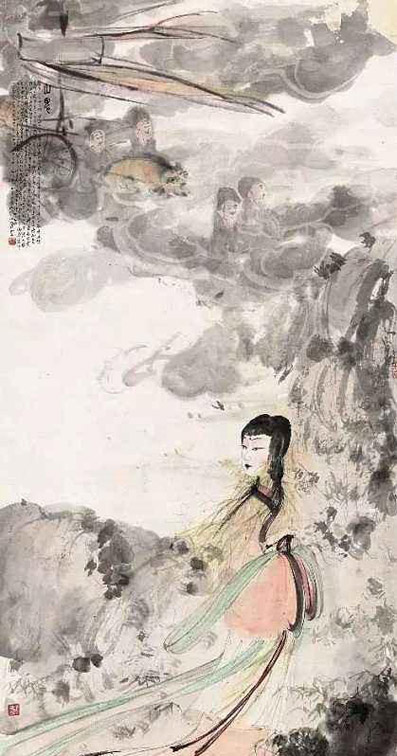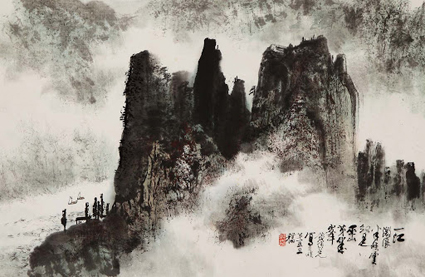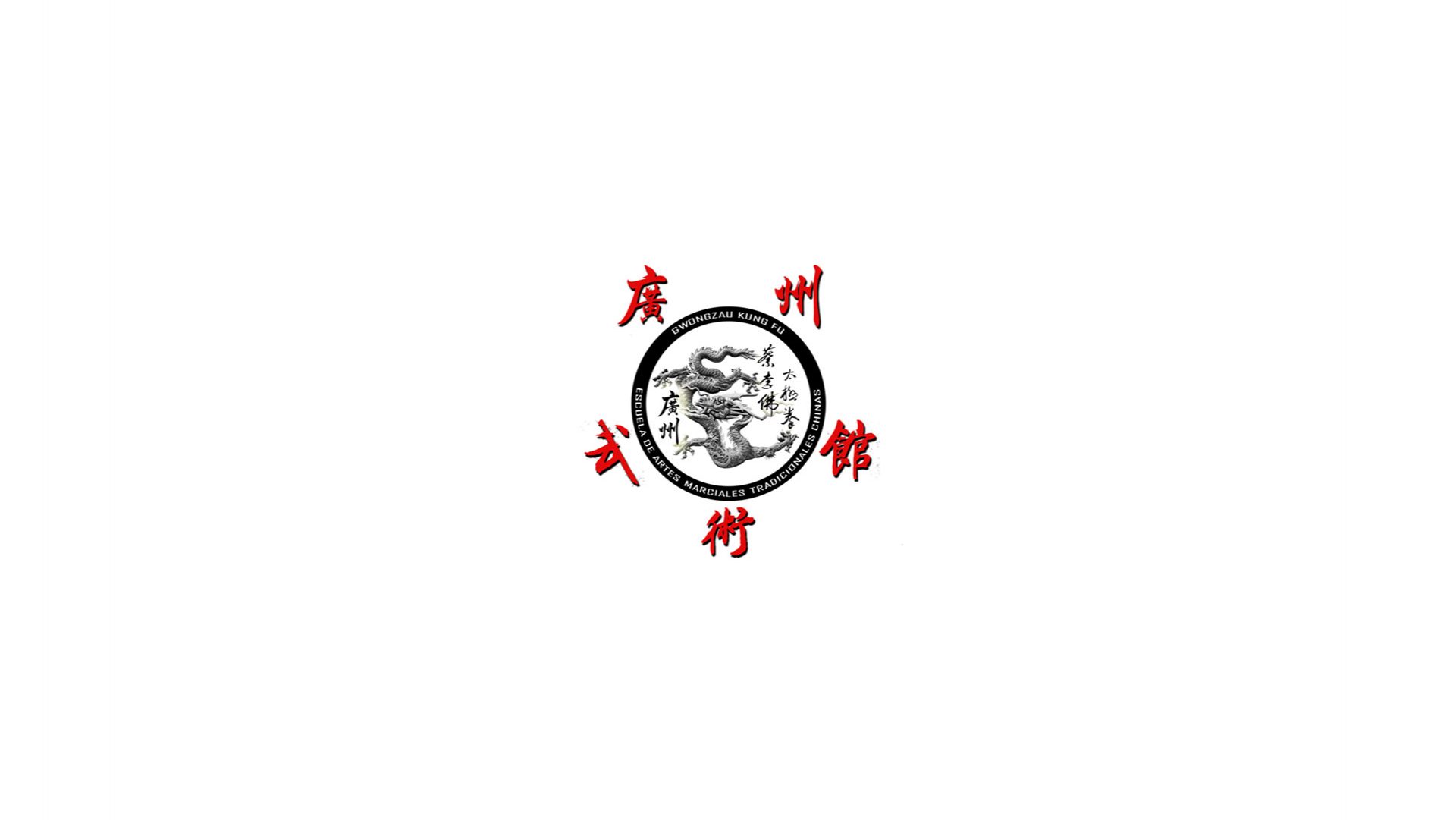Clouds and Rain on Mount Wūshān (巫山雲雨 Wū Shān yún yǔ) is an expression provenient from an erotic scene contained in the poem called Gāo Táng Fù 高唐賦, from the 3rd century B.C. The Chinese have incorporated this expression into spoken language to poetically signify the physical act of love between man and woman. Let's take a look at the story behind it, whose authorship is attributed to Sòng Yù 宋玉.

Sòng Yù 宋玉
Sòng Yù, also known as Zǐ Yuān 子渊, was a Chinese poet of the late Warring States Period (戰國時代 Zhànguó Shídài). The biographical information available about him is virtually zero and unreliable. Although the dates of his birth and death are unknown, he is believed to have lived in the first half of the 3rd century B.C., worked at the court of King Qǐng Xiāng 顷襄 of Chǔ 楚, and to have been a disciple of Qū Yuán 屈原, another great poet of that time. While this relationship is difficult to corroborate, it is true that Sòng Yù is the direct successor to Qū Yuán's poetry, and later generations used to refer to them together as Qū-Sòng 屈宋. Their works are contained in the anthology known as Verses of Chǔ (楚辭 Chǔ Cí), one of two great collections of ancient poetry.
In his works, Sòng Yù tends to describe scenes of nature delicately and exquisitely, and the combination of lyrism with description of the landscape is fluid and natural. One of his main contributions to classical Chinese poetry is the development of this nature theme.
Also attributed to Sòng Yù, although more unlikely, are some of the fù 賦, or rhapsodies, collected in the poetic and literary anthology of the 6th century known as Wén Xuǎn 文選. One of these rhapsodies is the Gāo Táng Fù.

The Gāo Táng Fù 高唐賦
The Gāo Táng Fù or Rhapsody of Gāo Táng occupies an important position in the history of Chinese literature. His authorship is usually attributed to Sòng Yù, although with certain doubts, and his name comes from the place where the action takes place.
The work begins with a prose preface that serves as an introduction to the rhapsody itself. It is in this preface that the sexual encounter between an ancient king of Chǔ and a female spirit or deity is narrated, an encounter that occurs in the world of dreams.
We reproduce this fragment below, with the original text in traditional Chinese, the phonetic transcription according to the pīnyīn 拼音 system and, finally, its English translation.
昔者楚襄王與宋玉游於雲夢之台,望高唐之觀,其上獨有雲氣,崪兮直上,忽兮改容,須臾之間,變化無窮。
xī zhě chǔ xiāng wáng yǔ sòng yù yóu yú yún mèng zhī tái, wàng gāo táng zhī guān, qí shàng dú yǒu yún qì, zú xī zhí shàng, hū xī gǎi róng, xū yú zhī jiān, biàn huà wú qióng.
King Xiāng of Chǔ and Sòng Yù were travelling on the Yúnmèng plateau and spotted the shrine of Gāo Táng, on which a strange cloud floated, as if it were an upright rock, and suddenly it began to change shape at every moment.
王問玉曰:“此何氣也?” 玉對曰:“所謂朝雲者也”。
wáng wèn yù yuē: “cǐ hé qì yě?” yù duì yuē: “suǒ wèi zhāo yún zhě yě”.
The king asked Yù: "What spirit is this?". Yù replied: "It is the so-called Morning Cloud."
王曰:“何謂朝雲?” 玉曰:“昔者先王嘗游高唐,怠而晝寢,夢見一婦人曰:‘妾,巫山之女也。為高唐之客。聞君游高唐,願薦枕席。’
wáng yuē: “hé wèi zhāo yún?” yù yuē: “xī zhě xiān wáng cháng yóu gāo táng, dài ér zhòu qǐn, mèng jiàn yī fù rén yuē: ‘qiè,wū shān zhī nǚ yě. wéi gāo táng zhī kè. wén jūn yóu gāo táng, yuàn jiàn zhěn xí.’
The king asked: "What is its meaning?". Yù said: "In the past, a former king passed near Gāo Táng, when in the middle of the day he felt tired and went to sleep, and dreamed of a woman who said to him: 'Your servant comes from Mount Wūshān. I'm traveling through Gāo Táng. I heard your Majesty was passing by and wished to offer you a bed.'
*(Here the girl uses the term qiè 妾, an old formula by which a woman referred to herself expressing humility, which can be translated as "servant" or "concubine").
王因幸之。去而辭曰:‘妾在巫山之陽,高丘之阻,旦為朝雲,暮為行雨。朝朝暮暮,陽台之下。’
wáng yīn xìng zhī. qù ér cí yuē: ‘qiè zài wū shān zhī yáng, gāo qiū zhī zǔ, dàn wéi zhāo yún, mù wéi xíng yǔ. zhāo zhāo mù mù,yáng tái zhī xià.’
The monarch enjoyed her. As they bade farewell, the young woman said, 'Your servant lives on the southern slope of Wūshān, blocked by high hills; at dawn I am morning clous, at dusk I am falling rain. From morning to sunset, beneath the southern crest.'
*(The word xìng 幸, which we have translated as enjoying, is very rich in meanings. Referring to a sovereign, it can literally mean "touring one's dominions" and even "granting favour." In this way, we can see an implicit metaphor of the possession of the woman as a subject by the sovereign, who enjoys her as if she was his own.)
旦朝視之,如言。故為立廟,號曰‘朝雲’。”
dàn zhāo shì zhī, rú yán. gù wéi lì miào, hào yuē ‘zhāo yún’.”
As he looked in the morning, it was just as she had said. And for this reason he had a temple built, called Zhāo Yún (Morning Cloud)."
王曰:“朝雲始生,狀若何也?” 玉對曰:“其始出也,兮若鬆榯﹔其少進也,晢兮若姣姬,揚袂鄣日,而望所思﹔忽兮改容,偈兮若駕駟馬,建羽旗﹔湫兮如風,淒兮如雨。風止雨霽,雲無所處。”
wáng yuē: “zhāo yún shǐ shēng, zhuàng ruò hé yě?” yù duì yuē: “ qí shǐ chū yě, xī ruò sōng shí; qí shǎo jìn yě, zhé xī ruò jiāo jī, yáng mèi zhāng rì, ér wàng suǒ sī; hū xī gǎi róng, jì xī ruò jià sì mǎ, jiàn yǔ qí; qiū xī rú fēng, qī xī rú yǔ. fēng zhǐ yǔ jì, yún wú suǒ chǔ.”
The king said: "When Morning Cloud appears, what form does she take?" Yù replied: "When she manifests herself, she is like a pine tree standing straight, but suddenly she changes and becomes a beautiful girl, rising her sleeves to protect her sigh from the sun and look away; and suddenly transforms into a horse-drawn carriage unfolding a feathered banner; wet as the wind, cold as rain. But then the wind stops and the rain ceases, and Morning Cloud disappears."
The king then expresses his desire to visit the shrine and asks Sòng Yù to describe it and the environment in which it is located, to which the poet finally responds in the form of a fù 賦 or rhapsody, a long rhymed passage with lines of between three and seven words in which he describes the nature surrounding the sanctuary, the mountain, its vegetation and the creatures that inhabit it. He ends by imagining the king on a hunt and advising him to maintain kindness towards his lands, to lament the mistakes of the people, to promote wise and benevolent men, and to provide the people with all that was scarce.
 Although the Gāo Táng Fù is not an erotic poem in itself, its preface is the most famous erotic scene in Chinese literature. In it, some of the power relations between ruler and subject are reproduced in the erotic realm, reinterpreting the body of the female spirit as the king's own domains. Even the Yúnmèng 雲夢 plateau seems to be named after the sexual act itself (yún 雲: “cloud”, mèng 夢: “dream”) .
Although the Gāo Táng Fù is not an erotic poem in itself, its preface is the most famous erotic scene in Chinese literature. In it, some of the power relations between ruler and subject are reproduced in the erotic realm, reinterpreting the body of the female spirit as the king's own domains. Even the Yúnmèng 雲夢 plateau seems to be named after the sexual act itself (yún 雲: “cloud”, mèng 夢: “dream”) .
Also, some of the expressions contained in the poem have become part of the Chinese popular speech:
朝雲暮雨 zhāo yún mù yǔ (Morning Cloud, Evening Rain)
巫山雲雨 Wū Shān yún yǔ (Clouds and Rain on Mount Wūshān), or simply
雲雨 yún yǔ (Clouds and Rain)
All these expressions are equivalent and come to mean the same thing: the sexual interaction or the physical act of love between man and woman. It is interesting to see how Chinese popular language can express these concepts in appearance mundane in a poetic way even in the common language.
Later, during the Táng 唐 dynasty, erotic poetry will develop as a genre of its own, making sensual descriptions of the woman and expressing feelings of physical love, and received the name of yàn tǐ shī 艳体诗.


2 thoughts on “Clouds and Rain on Mount Wushan”
Fascinating and beautiful.
I am just beginning to understand a little Chinese using the excellent ‘Pleco’ app.
Thank you!
Yes, Pleco is a really useful tool for Chinese learning.
Best wishes!